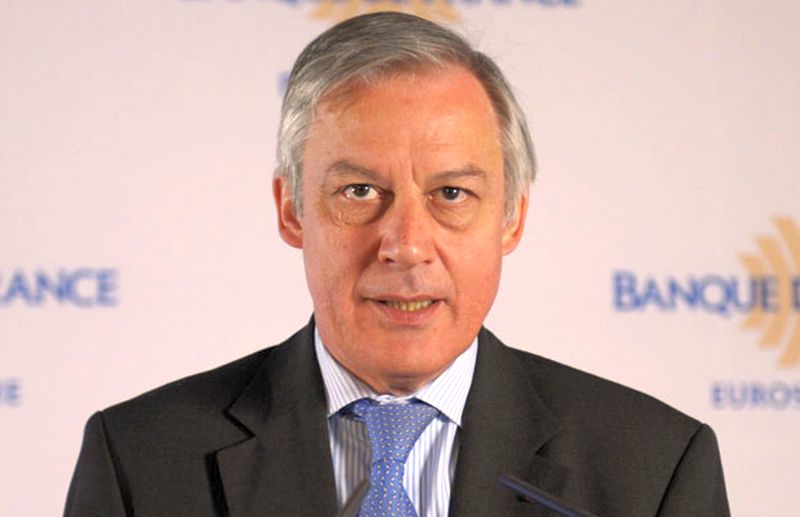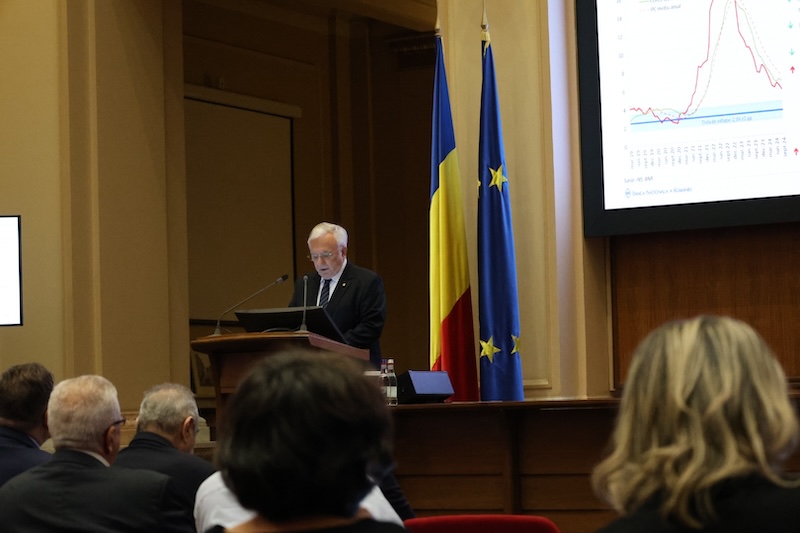Christian Noyer: Why the Economic and Monetary Union needs a banking union

Christian Noyer: Why the Economic and Monetary Union needs a banking union
Address by Mr Christian Noyer, Governor of the Bank of France and Chairman of the Board of Directors of the Bank for International Settlements, at the Lamfalussy Lectures Conference “The euro dilemma: inside or outside?”, Budapest, 31 January 2014.
5 Feb 2014
Dear Governors,
Ladies and gentlemen,
Before I begin with my address, I would like to thank very warmly Governor Matolcsy for having invited me. I would also like to congratulate him and the Magyar Nemzeti Bank for the very prestigious and interesting conference you organized.
My address is about the latest step of European integration, namely the banking union.
As you are aware, these past 14 years of monetary union have brought huge benefits: the purchasing power of more than 300 million users of the single currency has been more protected than ever thanks to stable and moderate inflation; the currency risk between euro area countries has been eliminated, helping to foster growth and maintain stability; and the single currency has simplified and stimulated both trade and labour mobility.
However, even with all these benefits, the euro area still did not manage to escape the crisis, and one of the most important lessons from this period was that monetary union was insufficiently complete and coherent.
In 2012, a consensus was reached over how we could resolve this failing. The answer was crystal clear: Europe needed to move towards a banking union.
Let me go over some of the reasons why we chose this path.
The euro area crisis, and in particular the more acute episodes of banking turmoil, revealed a number of basic weaknesses at the heart of the monetary union.
i) First, the problems encountered by some of the big banks severely damaged the fiscal stance in certain countries, where the state had to step in to save these banks. This, in turn, undermined market confidence in the sustainability of the resulting fast growing public debts, which led to sharp rises in the rates at which those countries could borrow on the market, as, for example, in the case of Ireland.
ii) Second, there was a perception that countries with impaired public finances would have difficulty bailing out their respective financial systems in the event of a problem. This resulted in a widespread loss of confidence and pushed up borrowing costs for banks and sovereigns, as in the case of Italy.
iii) In response to these tensions, the European Central Bank took unprecedented steps to lower the cost of bank refinancing, cutting its key policy rates to historically low levels and providing unlimited 3-year liquidity. But even this proved insufficient to calm market tensions. In some countries at least, monetary policy measures were simply not being fully transmitted to the real economy.
What was the reason behind these three phenomena, which were largely responsible for the escalation of the crisis in the euro area? It was the vicious circle that developed between the state of a country’s banking sector and its perceived sovereign credit quality. And why did this vicious circle emerge? Because of the lack of banking union:
In a monetary union, capital can circulate freely and rapidly from one country to another, which can amplify the potential fallout from “banking panics”, unless there are effective supranational mechanisms in place for supervision, resolution and the guarantee of deposits;
As long as the financial health of the euro area remains at the mercy of the difficulties encountered by one of its member countries, there is a threat that negative interactions may develop between sovereign credit risk and banking risk;
In reality, the lack of a banking union allowed a high degree of fragmentation to develop within the euro area banking system and this, in turn, nourished doubts about the “singleness” of the euro.
The crisis thus made it clear that a uniformly healthy financial system was vital to safeguard the stability of the euro area and ensure the effective transmission of a single monetary policy.
Once we had agreed on this reasoning, we had to come up with a concrete solution.
The key to banking union can be summed up as follows: the aim is to find a way to ensure that banks in the euro area are considered precisely as that, as “euro area banks”, and not as “Irish”, “German” or “Italian” banks. In other words, the goal is to ensure that credit conditions in the euro area will not depend on where you are but on who you are, which is what should be expected of an efficient financial market.
To achieve this, we need to have three things in place:
i) Federal bank supervision, to guarantee that all institutions are subject to the same rules and same methods of control. A supra-national supervisor is in fact better placed to assess the risks of cross-border activities and therefore to protect and encourage such activities; it is not subject to national biases that can lead to the temptation of economic introversion. It is therefore more credible and strengthens stability and confidence in the area;
ii) A unified mechanism for the resolution of banking crises, so that individual countries no longer have to shoulder the burden of major upheavals on their own;
iii) A unified deposit-guarantee mechanism to avoid banking panics.
Over the past year, these ideas and words have translated into concrete actions, and Europe has demonstrated that it can carry out rapid, in-depth reforms, to ensure it emerges stronger from the crisis. I would just like to tell you where we stand currently in the move towards banking union.
As you know, the area in which we have made the most progress is in supervision.
European heads of state agreed to the principle of a single supervisory mechanism at the end of 2012, and we are in the process of actively preparing its implementation.
By November, the main banks in the euro area will be supervised by a federalized system headed in Frankfurt. A Supervisory Board will be established to plan and carry out the ECB’s supervisory tasks, undertake preparatory work, and propose complete draft decisions for adoption by the ECB’s Governing Council.
Moreover, the entire European banking system, including Hungary of course, will be supervised on the basis of a single set of principles – the Single Rulebook – which has been compiled by the European Banking Authority. This is a huge step towards a more unified and consistent European banking system, and one that is therefore more robust and efficient.
The move towards a Single Supervisory Mechanism is firmly on track. Last October, we reached another important milestone with the announcement by the ECB that European banks will be subject to a Comprehensive Assessment prior to the set up of the SSM in November 2014.
This exercise is now underway. We must be aware that the exercise is an unprecedented one: about 130 participating banks – including 13 French banking groups – representing 85% of the total assets of European banks, will simultaneously undergo a thorough asset quality review (AQR) using a common methodology, and this will be followed up with stress tests this summer.
The purpose of this rigorous exercise is threefold:
– to foster transparency about the condition of the European banking system;
– to take the needed corrective actions;
– and finally to restore confidence.
Of course, this exercise is a challenge. But I think that it is also a great opportunity for European banks to show that they have cleaned up their balance sheets and that they are trustworthy.
As you can see, the SSM is well on track and I am fully confident that it will be operational at the end of this year, as expected. But this good result should not lead to forget that for the banking union to be fully successful, the SSM needs to be completed with the adoption of a Single Resolution Mechanism.
Indeed, in line with my colleagues at the ECB, I consider the Single Resolution Mechanism to be another essential pillar of the banking union, alongside the SSM. Ideally, the SRM should consist of three main elements: a single system, a single authority and a single fund.
This is why the ECB has constantly been encouraging all the relevant parties to make further progress in adopting the SRM, which should be in place by the time the SSM becomes operational. You know that a political debate is taking place currently between the European Council of Ministers and the European Parliament.
The version of the SRM that has been agreed among European governments at the end of last year is not ideal, notably because it requires a long transition period which could fuel uncertainties. But what matters most is that we have clear and common set of rules concerning banks resolution. For the mechanism in itself, Europe has proven in the past that, confronted to acute crisis, it was able to accelerate the processes and deepen its solidarity.
Ladies and gentlemen, I hope I have managed to give you a clear and up-to-date picture of the advance towards banking union. I would like to conclude by stressing just how crucial this development is in order to strengthen our economic and monetary union.
I think that the ECB proved, in the darkest moments of the crisis, that it was completely committed to the euro. Our actions were driven by a profound belief that the single currency is our most valuable shared asset and that it brings enormous economic benefits. Today, with the construction of a banking union, we aim to demonstrate that this is a long-term commitment.
Thank you for your attention.
Comentarii
Adauga un comentariu
Alte stiri din categoria: Opinie
Dobanda BNR ar putea scadea la 5,75% in 2025
Dobanda de politica monetara a BNR (Banca Nationala a Romaniei) ar putea fi scazuta de trei ori in acest an, la 5,75%, de la 6,5%, cat este in prezent, conform... detalii
Dobanda la euro ar putea scadea de la 3% la 1,5%, in 2025
Dobanda de politica monetara a Bancii Centrale Europene (BCE) ar putea scadea de la 3% in prezent la 1,5% pana la finalul lui 2025, prognozeaza economistii. „Ne asteptam ca BCE... detalii
Creditare iresponsabila promovata de un broker
„Stiai ca poti sa iei un card de credit chiar daca ai gradul de indatorare depasit? Te ajutam cu un card de credit chiar daca banca ti-a spus ca ai... detalii
Inflatia este si consecinta cresterii salariilor
Inflatia mare este si consecinta cresterii salariilor, a precizat guveatorul BNR, Mugur Isarescu, cu ocazia prezentarii raportului privind inflatia din 11 noiembrie 2024.Seceta puteica, oferta insuficienta de produse alimentare si... detalii
 ING ramane singura dintre bancile romanesti care-si face corect reclama la credite
ING ramane singura dintre bancile romanesti care-si face corect reclama la credite
 Cardurile devin inutile: acum se pot face plati instant gratis din aplicatiile bancare
Cardurile devin inutile: acum se pot face plati instant gratis din aplicatiile bancare
 Au neglijat bancile securitatea pentru digitalizare?
Au neglijat bancile securitatea pentru digitalizare?
 BRD isi lichideaza filialele din Romania. Va fi vanduta si banca?
BRD isi lichideaza filialele din Romania. Va fi vanduta si banca?
 De ce permit bancile transferuri catre platforme de criptomonede prin care se fac fraude online?
De ce permit bancile transferuri catre platforme de criptomonede prin care se fac fraude online?
 Banca Transilvania implineste 30 de ani
Banca Transilvania implineste 30 de ani
 De cand si cat de mult ar putea sa scada dobanzile in 2024?
De cand si cat de mult ar putea sa scada dobanzile in 2024?
 Ce responsabilitate au bancile in cazul fraudelor online?
Ce responsabilitate au bancile in cazul fraudelor online?
 Creditele ipotecare ar putea creste in 2024, estimeaza Banca Transilvania
Creditele ipotecare ar putea creste in 2024, estimeaza Banca Transilvania
 Rambursarea ratelor la credite in Romania se face ca in celelalte tari din Europa; motoda propusa de ANPC este contrara interesului consumatorilor
Vezi toate stirile
Rambursarea ratelor la credite in Romania se face ca in celelalte tari din Europa; motoda propusa de ANPC este contrara interesului consumatorilor
Vezi toate stirile
Criza COVID-19
- In majoritatea unitatilor BRD se poate intra fara certificat verde
- La BCR se poate intra fara certificat verde
- Firmele, obligate sa dea zile libere parintilor care stau cu copiii in timpul pandemiei de coronavirus
- CEC Bank: accesul in banca se face fara certificat verde
- Cum se amana ratele la creditele Garanti BBVA
Topuri Banci
- Topul bancilor dupa active si cota de piata in perioada 2022-2015
- Topul bancilor cu cele mai mici dobanzi la creditele de nevoi personale
- Topul bancilor la active in 2019
- Topul celor mai mari banci din Romania dupa valoarea activelor in 2018
- Topul bancilor dupa active in 2017
Asociatia Romana a Bancilor (ARB)
- Băncile din România nu au majorat comisioanele aferente operațiunilor în numerar
- Concurs de educatie financiara pentru elevi, cu premii in bani
- Creditele acordate de banci au crescut cu 14% in 2022
- Romanii stiu educatie financiara de nota 7
- Gradul de incluziune financiara in Romania a ajuns la aproape 70%
ROBOR
- ROBOR: ce este, cum se calculeaza, ce il influenteaza, explicat de Asociatia Pietelor Financiare
- ROBOR a scazut la 1,59%, dupa ce BNR a redus dobanda la 1,25%
- Dobanzile variabile la creditele noi in lei nu scad, pentru ca IRCC ramane aproape neschimbat, la 2,4%, desi ROBOR s-a micsorat cu un punct, la 2,2%
- IRCC, indicele de dobanda pentru creditele in lei ale persoanelor fizice, a scazut la 1,75%, dar nu va avea efecte imediate pe piata creditarii
- Istoricul ROBOR la 3 luni, in perioada 01.08.1995 - 31.12.2019
Taxa bancara
- Normele metodologice pentru aplicarea taxei bancare, publicate de Ministerul Finantelor
- Noul ROBOR se va aplica automat la creditele noi si prin refinantare la cele in derulare
- Taxa bancara ar putea fi redusa de la 1,2% la 0,4% la bancile mari si 0,2% la cele mici, insa bancherii avertizeaza ca indiferent de nivelul acesteia, intermedierea financiara va scadea iar dobanzile vor creste
- Raiffeisen anunta ca activitatea bancii a incetinit substantial din cauza taxei bancare; strategia va fi reevaluata, nu vor mai fi acordate credite cu dobanzi mici
- Tariceanu anunta un acord de principiu privind taxa bancara: ROBOR-ul ar putea fi inlocuit cu marja de dobanda a bancilor
Statistici BNR
- Deficitul contului curent, aproape 20 miliarde euro după primele nouă luni
- Deficitul contului curent, aproape 18 miliarde euro după primele opt luni
- Deficitul contului curent, peste 9 miliarde euro pe primele cinci luni
- Deficitul contului curent, 6,6 miliarde euro după prima treime a anului
- Deficitul contului curent pe T1, aproape 4 miliarde euro
Legislatie
- Legea nr. 311/2015 privind schemele de garantare a depozitelor şi Fondul de garantare a depozitelor bancare
- Rambursarea anticipata a unui credit, conform OUG 50/2010
- OUG nr.21 din 1992 privind protectia consumatorului, actualizata
- Legea nr. 190 din 1999 privind creditul ipotecar pentru investiții imobiliare
- Reguli privind stabilirea ratelor de referinţă ROBID şi ROBOR
Lege plafonare dobanzi credite
- Care este dobanda maxima la un credit IFN?
- BNR propune Parlamentului plafonarea dobanzilor la creditele bancilor intre 1,5 si 4 ori peste DAE medie, in functie de tipul creditului; in cazul IFN-urilor, plafonarea dobanzilor nu se justifica
- Legile privind plafonarea dobanzilor la credite si a datoriilor preluate de firmele de recuperare se discuta in Parlament (actualizat)
- Legea privind plafonarea dobanzilor la credite nu a fost inclusa pe ordinea de zi a comisiilor din Camera Deputatilor
- Senatorul Zamfir, despre plafonarea dobanzilor la credite: numai bou-i consecvent!
Anunturi banci
- Cate reclamatii primeste Intesa Sanpaolo Bank si cum le gestioneaza
- Platile instant, posibile la 13 banci
- Aplicatia CEC app va functiona doar pe telefoane cu Android minim 8 sau iOS minim 12
- Bancile comunica automat cu ANAF situatia popririlor
- BRD bate recordul la credite de consum, in ciuda dobanzilor mari, si obtine un profit ridicat
Analize economice
- Inflația anuală, peste pragul de 5% în 2024
- Deficit bugetar de -7,12% din PIB, după 11 luni din 2024
- România, „lanterna roșie†a cheltuielilor pentru cercetare-dezvoltare în UE
- Deficitul contului curent, peste 24 miliarde euro după primele zece luni
- Deficit comercial record în octombrie 2024
Ministerul Finantelor
- Datoria publică, 51,4% din PIB la mijlocul anului
- Deficit bugetar de 3,6% din PIB după prima jumătate a anului
- Deficit bugetar de 3,4% din PIB după primele cinci luni ale anului
- Deficit bugetar îngrijorător după prima treime a anului
- Deficitul bugetar, -2,06% din PIB pe primul trimestru al anului
Biroul de Credit
- FUNDAMENTAREA LEGALITATII PRELUCRARII DATELOR PERSONALE IN SISTEMUL BIROULUI DE CREDIT
- BCR: prelucrarea datelor personale la Biroul de Credit
- Care banci si IFN-uri raporteaza clientii la Biroul de Credit
- Ce trebuie sa stim despre Biroul de Credit
- Care este procedura BCR de raportare a clientilor la Biroul de Credit
Procese
- ANPC pierde un proces cu Intesa si ARB privind modul de calcul al ratelor la credite
- Un client Credius obtine in justitie anularea creditului, din cauza dobanzii prea mari
- Hotararea judecatoriei prin care Aedificium, fosta Raiffeisen Banca pentru Locuinte, si statul sunt obligati sa achite unui client prima de stat
- Decizia Curtii de Apel Bucuresti in procesul dintre Raiffeisen Banca pentru Locuinte si Curtea de Conturi
- Vodafone, obligata de judecatori sa despagubeasca un abonat caruia a refuzat sa-i repare un telefon stricat sau sa-i dea banii inapoi (decizia instantei)
Stiri economice
- Deficitul comercial a depașit pragul de 30 miliarde euro în noiembrie 2024
- Inflația anuală a crescut la 5,11%, prin efect de bază
- Datoria publică, 54,4% din PIB la finele lunii septembrie 2024
- România, tot prima dar în trendul UE la inflația anuală
- Datoria publică, 52,7% din PIB la finele lunii august 2024
Statistici
- România, pe locul trei în UE la creșterea costului muncii în T2 2024
- Cheltuielile cu pensiile - România, pe locul 19 în UE ca pondere în PIB
- Dobanda din Cehia a crescut cu 7 puncte intr-un singur an
- Care este valoarea salariului minim brut si net pe economie in 2024?
- Cat va fi salariul brut si net in Romania in 2024, 2025, 2026 si 2027, conform prognozei oficiale
FNGCIMM
- Programul IMM Invest continua si in 2021
- Garantiile de stat pentru credite acordate de FNGCIMM au crescut cu 185% in 2020
- Programul IMM invest se prelungeste pana in 30 iunie 2021
- Firmele pot obtine credite bancare garantate si subventionate de stat, pe baza facturilor (factoring), prin programul IMM Factor
- Programul IMM Leasing va fi operational in perioada urmatoare, anunta FNGCIMM
Calculator de credite
- ROBOR la 3 luni a scazut cu aproape un punct, dupa masurile luate de BNR; cu cat se reduce rata la credite?
- In ce mall din sectorul 4 pot face o simulare pentru o refinantare?
Noutati BCE
- Acord intre BCE si BNR pentru supravegherea bancilor
- Banca Centrala Europeana (BCE) explica de ce a majorat dobanda la 2%
- BCE creste dobanda la 2%, dupa ce inflatia a ajuns la 10%
- Dobânda pe termen lung a continuat să scadă in septembrie 2022. Ecartul față de Polonia și Cehia, redus semnificativ
- Rata dobanzii pe termen lung pentru Romania, in crestere la 2,96%
Noutati EBA
- Bancile romanesti detin cele mai multe titluri de stat din Europa
- Guidelines on legislative and non-legislative moratoria on loan repayments applied in the light of the COVID-19 crisis
- The EBA reactivates its Guidelines on legislative and non-legislative moratoria
- EBA publishes 2018 EU-wide stress test results
- EBA launches 2018 EU-wide transparency exercise
Noutati FGDB
- Banii din banci sunt garantati, anunta FGDB
- Depozitele bancare garantate de FGDB au crescut cu 13 miliarde lei
- Depozitele bancare garantate de FGDB reprezinta doua treimi din totalul depozitelor din bancile romanesti
- Peste 80% din depozitele bancare sunt garantate
- Depozitele bancare nu intra in campania electorala
CSALB
- Sistemul bancar romanesc este deosebit de bine pregatit pentru orice fel de socuri
- La CSALB poti castiga un litigiu cu banca pe care l-ai pierde in instanta
- Negocierile dintre banci si clienti la CSALB, in crestere cu 30%
- Sondaj: dobanda fixa la credite, considerata mai buna decat cea variabila, desi este mai mare
- CSALB: Romanii cu credite caută soluții pentru reducerea ratelor. Cum raspund bancile
First Bank
- Ce trebuie sa faca cei care au asigurare la credit emisa de Euroins
- First Bank este reprezentanta Eurobank in Romania: ce se intampla cu creditele Bancpost?
- Clientii First Bank pot face plati prin Google Pay
- First Bank anunta rezultatele financiare din prima jumatate a anului 2021
- First Bank are o noua aplicatie de mobile banking
Noutati FMI
- FMI: criza COVID-19 se transforma in criza economica si financiara in 2020, suntem pregatiti cu 1 trilion (o mie de miliarde) de dolari, pentru a ajuta tarile in dificultate; prioritatea sunt ajutoarele financiare pentru familiile si firmele vulnerabile
- FMI cere BNR sa intareasca politica monetara iar Guvernului sa modifice legea pensiilor
- FMI: majorarea salariilor din sectorul public si legea pensiilor ar trebui reevaluate
- IMF statement of the 2018 Article IV Mission to Romania
- Jaewoo Lee, new IMF mission chief for Romania and Bulgaria
Noutati BERD
- Creditele neperformante (npl) - statistici BERD
- BERD este ingrijorata de investigatia autoritatilor din Republica Moldova la Victoria Bank, subsidiara Bancii Transilvania
- BERD dezvaluie cat a platit pe actiunile Piraeus Bank
- ING Bank si BERD finanteaza parcul logistic CTPark Bucharest
- EBRD hails Moldova banking breakthrough
Noutati Federal Reserve
- Federal Reserve anunta noi masuri extinse pentru combaterea crizei COVID-19, care produce pagube "imense" in Statele Unite si in lume
- Federal Reserve urca dobanda la 2,25%
- Federal Reserve decided to maintain the target range for the federal funds rate at 1-1/2 to 1-3/4 percent
- Federal Reserve majoreaza dobanda de referinta pentru dolar la 1,5% - 1,75%
- Federal Reserve issues FOMC statement
Noutati BEI
- BEI a redus cu 31% sprijinul acordat Romaniei in 2018
- Romania implements SME Initiative: EUR 580 m for Romanian businesses
- European Investment Bank (EIB) is lending EUR 20 million to Agricover Credit IFN
Mobile banking
- Comisioanele BRD pentru MyBRD Mobile, MyBRD Net, My BRD SMS
- Termeni si conditii contractuale ale serviciului You BRD
- Recomandari de securitate ale BRD pentru utilizatorii de internet/mobile banking
- CEC Bank - Ghid utilizare token sub forma de card bancar
- Cinci banci permit platile cu telefonul mobil prin Google Pay
Noutati Comisia Europeana
- Avertismentul Comitetului European pentru risc sistemic (CERS) privind vulnerabilitățile din sistemul financiar al Uniunii
- Cele mai mici preturi din Europa sunt in Romania
- State aid: Commission refers Romania to Court for failure to recover illegal aid worth up to €92 million
- Comisia Europeana publica raportul privind progresele inregistrate de Romania in cadrul mecanismului de cooperare si de verificare (MCV)
- Infringements: Commission refers Greece, Ireland and Romania to the Court of Justice for not implementing anti-money laundering rules
Noutati BVB
- BET AeRO, primul indice pentru piata AeRO, la BVB
- Laptaria cu Caimac s-a listat pe piata AeRO a BVB
- Banca Transilvania plateste un dividend brut pe actiune de 0,17 lei din profitul pe 2018
- Obligatiunile Bancii Transilvania se tranzactioneaza la Bursa de Valori Bucuresti
- Obligatiunile Good Pople SA (FRU21) au debutat pe piata AeRO
Institutul National de Statistica
- Deficitul contului curent, peste 26 miliarde euro în noiembrie 2024
- Comerțul cu amănuntul - în creștere cu 8% pe primele 10 luni
- Deficitul balanței comerciale la 9 luni, cu 15% mai mare față de aceeași perioadă a anului trecut
- Producția industrială, în scădere semnificativă
- Pensia reală, în creștere cu 8,7% pe luna august 2024
Informatii utile asigurari
- Data de la care FGA face plati pentru asigurarile RCA Euroins: 17 mai 2023
- Asigurarea împotriva dezastrelor, valabilă și in caz de faliment
- Asiguratii nu au nevoie de documente de confirmare a cutremurului
- Cum functioneaza o asigurare de viata Metropolitan pentru un credit la Banca Transilvania?
- Care sunt documente necesare pentru dosarul de dauna la Cardif?
ING Bank
- La ING se vor putea face plati instant din decembrie 2022
- Cum evitam tentativele de frauda online?
- Clientii ING Bank trebuie sa-si actualizeze aplicatia Home Bank pana in 20 martie
- Obligatiunile Rockcastle, cel mai mare proprietar de centre comerciale din Europa Centrala si de Est, intermediata de ING Bank
- ING Bank transforma departamentul de responsabilitate sociala intr-unul de sustenabilitate











